Documenting my struggles of studying for the Japanese Language Proficiency Test N2
Don't wanna be here? Send us removal request.
Text

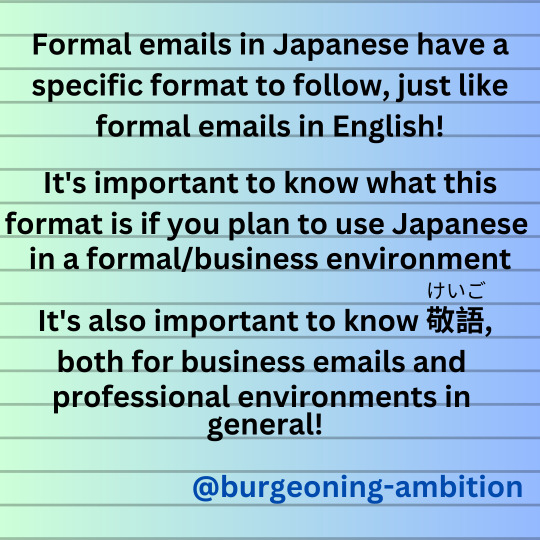
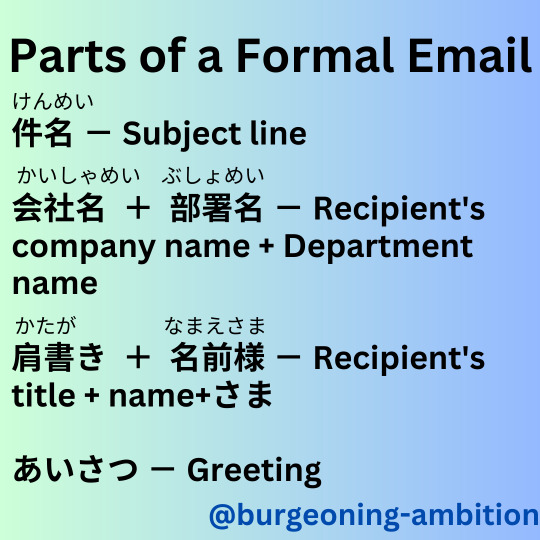

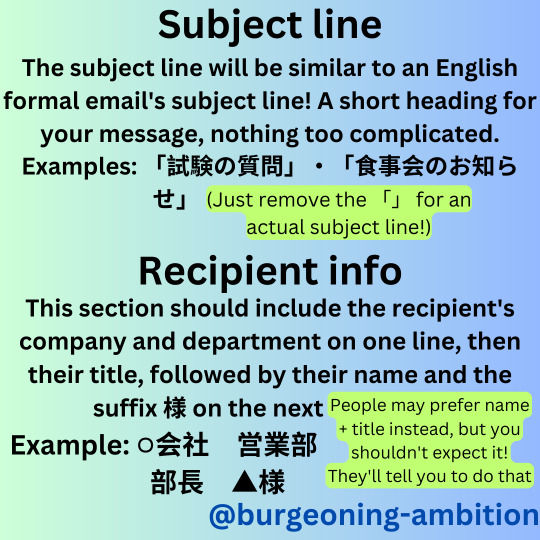

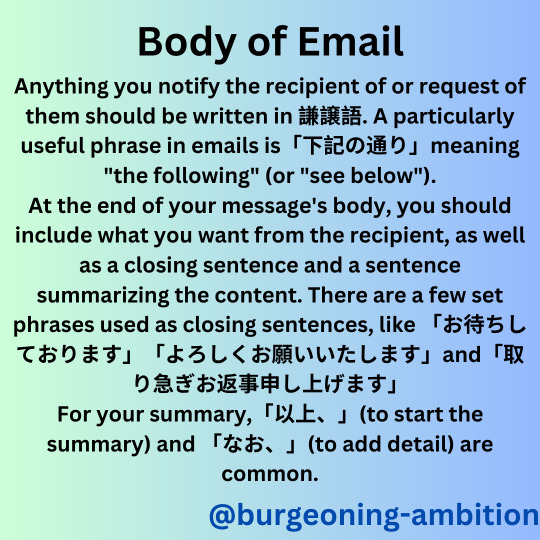
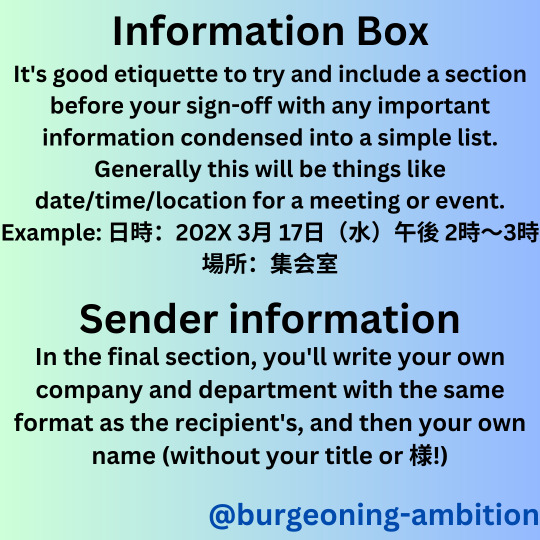
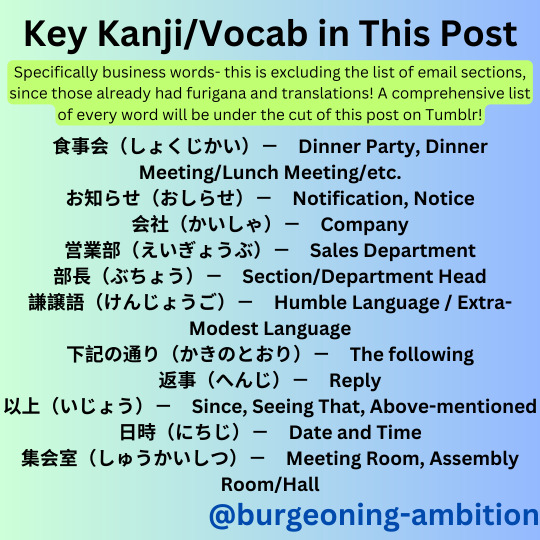

Business Japanese Review Part One: Emails!
I'm not sure how many posts I'll make about Business Japanese, but probably more than one so I say the part one is warranted, haha.
Feel free to add anything or any questions in the notes! Like I said, this isn't a fully comprehensive infographic. Also, what do people think of the lined paper style background for the title page/intro? I think they look kinda cute for the introduction, but not for the informative parts...
One thing I will add that I couldn't fit on the slides: I think some textbooks don't have super clear distinctions between 「謙譲語Ⅰ」 「謙譲語Ⅱ」 and 「ていねいご」, so I only specifically mention 謙譲語 broadly here. Parts of 謙譲語Ⅱ and ていねいご are both described as "extra-modest" in some things, for example! Just keep in mind that my post is a simplification, and if you're interested in formal language, maybe start at learning all of the different keigo categories and what they involve!
Vocab list note: The set phrases in the greetings and closings are all comparable to set phrases in English for greetings and closings of emails. I'm putting these set phrases in their entirety in the list, with a comparable English set phrase as the definition. Do not take these as equivalent phrases! They have a similar feeling, but I am not asserting that they have identical meanings. I'm just offering something comparable in case it helps a person make more sense of them!
The full vocab list + a transcript of the post is under the cut!
Vocabulary List
試験(しけん)- Exam, test
質問(しつもん)- Question
食事会(しょくじかい)- Dinner Party, Dinner Meeting/Lunch Meeting/etc.
お知らせ(おしらせ)- Notification, Notice
会社(かいしゃ)- Company
営業部(えいぎょうぶ)- Sales Department
部長(ぶちょう)- Section/Department Head
「いつもお世話になっております」 - This is a basic email greeting, similar to "Good afternoon" or "Hello, [name]" even though the meaning doesn't match at all!
「だんだん涼しくなってまいりました」 - Similar to "I hope this email finds you well"
さて - Now, Well, Then
謙譲語(けんじょうご)- Humble Language / Extra-Modest Language
下記の通り(かきのとおり)- The Following
返事(へんじ)- Reply
「お待ちしております」 - Similar to "Awaiting your reply"
「よろしくお願いいたします」 - Similar to "Thank you"
「取り急ぎお返事申し上げます」 - Similar to "Please get back to me soon"
申し上げます(もうしあげます)- To Offer, To Extend (thanks, congratulations, greetings, etc.), To Do, To State(謙譲語)
以上(いじょう)- Since, Seeing That, Above-mentioned
なお - Furthermore, In Addition
日時(にちじ)- Date and Time
午後(ごご)- PM (Time)
場所(ばしょ)- Place, Location
集会室(しゅうかいしつ)- Meeting Room, Assembly Room/Hall
901 notes
·
View notes
Text
JLPT is in a day, I'm honestly not sure if I'll be passing or not, the last few months have been tumultuous due to family stuff which took away significant study time and also ruined my mental health.
But!!! I hope that I do my best and for anyone else who is giving the test I hope you also do your best and are proud of yourself at the end of the day no matter what!
Thank you to everybody who has been following my blog! It is great sharing my journey with such a wonderful community! ❤️

#japanese#japanese language#jlpt#jlpt n2#languages#studyblr#studying#japanese books#language learning#study with me
12 notes
·
View notes
Text
Just two months left for the JLPT N2. Pretty stressed out lol.

#japanese#japanese language#jlpt#jlpt n2#languages#studyblr#studying#japanese books#language learning#study with me
8 notes
·
View notes
Text
Been practicing reading!
The full NHK articles are pretty nice, I'd definitely recommend it for N2 learners.
You can also check out Yomitan. It's a cursor dictionary that helps out a lot.

Some easier recourses I recommend for reading practice:
1. NHK Easy News
2. Todaii
3. Yomu Yomu
4. Tadoku
#japanese#japanese language#jlpt#jlpt n2#languages#studyblr#studying#japanese books#language learning#study with me#japanese resources
15 notes
·
View notes
Text
Had a very productive day today!
I'm almost done with the syllabus. I'll be done with it in two weeks and these days I'm focusing on reading as well.
Here's all I did today:
40 vocab, 14 kanji and 5 grammar points
557 anki cards
One full NHK news article about Kier Starmer
One episode of Alice in Borderland (rewatch)
2 Yomu Yomu articles
2 NHK easy news articles
1 Todai article
I'm kinda struggling with anxiety related to the exam. Even though I'm doing very well like today I did 7.5 hours of studying but I'm very stressed about it all. Even on my one break day during the week I was anxious and thinking about the exam all day so if anyone knows any realistic tips on how to deal with that please do share!

#japanese#japanese language#jlpt#jlpt n2#languages#studyblr#studying#japanese books#language learning#study with me#日本語の勉強#にほんご#日本語#読解
9 notes
·
View notes
Text
Practical Japanese Vocab: Coupons
I got some coupons from 7-Eleven yesterday so here's some vocab from them:
目印(めじるし)mark (for quick identification)
対象(たいしょう)target, coverage, subject (of taxation etc)
対象外(たいしょうがい)not covered by, not subject to
標準価格(ひょうじゅんかかく)normal price
税抜(ぜいぬき)tax excluded
値引き(ねびき)price reduction, discount
併用(へいよう)combined with, using together
本券(ほんけん)this ticket
該当(がいとう)corresponding to, applicable to, relevant to, coming under, qualifying for
販売(はんばい)sales, selling, marketing
店舗(てんぽ)store, establishment, restaurant
取り扱い(とりあつかい)treatment, service, handling
異なる(ことなる)to differ, to be different
地域(ちいき)region, area, district, locality
Sentences:
このロゴが目印 Marked with this logo
ご予約弁当も対象です。Also covers certain (targeted) bentos.
セブンプレミアムは対象外です。Seven Premium (products) are not covered.
標準価格(税抜)からの値引きとなります。Discount is from standard price (excluding tax)
他のクーポンとの併用はできません。Cannot be used together with other coupons
本券1枚につき該当商品いずれか1コ。Each voucher is for one qualifying product.
カウンター内で販売している揚げ物・フランクが対象です。Applies to fried foods and frankfurters sold at the counter.
店舗により取り扱いの無い場合がございます。Depending on store, products may not be available.
地域により商品名・価格・商品パッケートは異なる場合がおざいます。Product names, prices and packaging my vary depending on region.
307 notes
·
View notes
Text
If you have achieved something, please remember to observe a mandatory period of basking in the warm glow of your achievement like a lizard on a stone, lest you teach your brain that effort is futile, actually, because it didn't get to enjoy its happy chemicals, so, naturally, nothing good ever comes of trying. (And no, avoiding punishment is not a reward!)
I recommend, like, 5% of basking time in relation to whatever time you invested into achieving the thing minimum. And if you can't make your own bask, friend-brought is fine (= tell your friends!).
90K notes
·
View notes
Text
Keeping up with my goals!


I'm struggling a lot with the reading section and I really don't know how to fix my reading skills. Everyone suggests to read more but it's so hard to focus and keep reading when you don't understand things and get demotivated. If anyone has any tips for me I would really appreciate it!
Hope you guys are doing great!
#japanese#japanese language#jlpt#japanese books#jlpt n2#languages#studyblr#studying#language learning#study with me#日本語の勉強#にほんご#日本語
138 notes
·
View notes
Text
Learning some vocab!
I love this Shinkanzen Tango book and I recommend it to everyone.

I'm also tracking my progress regularly! I'm gonna be done with syllabus this month.

Lemme know how your preparation is going on! Is anyone else preparing for JLPT N2?
#japanese#japanese language#jlpt#jlpt n2#languages#studyblr#studying#japanese books#language learning#study with me#日本語#日本語の勉強
5 notes
·
View notes
Text
It's my break day today but here's a glimpse from my studying from last week!


I'm almost halfway done with the syllabus.
#japanese#japanese language#jlpt#jlpt n2#languages#studyblr#studying#japanese books#language learning#study with me
4 notes
·
View notes
Text
I've finished week one of my study plan!!!
I finished all the goals and I'm really proud of how consistent I was through the week.
Tomorrow is my rest day and I'm so excited for it lol.
Hope you guys are doing great! Remember to do your best and take breaks!

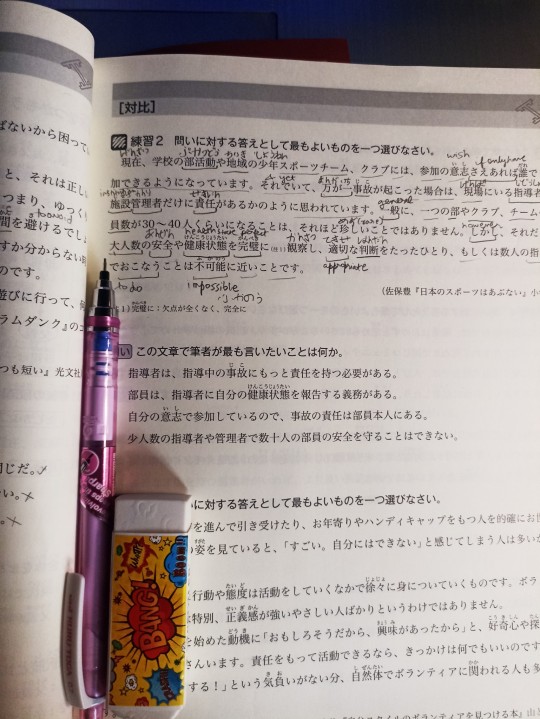

#japanese#japanese language#jlpt#jlpt n2#languages#studyblr#studying#japanese books#language learning#study with me#study aesthetic#study motivation#study blog
135 notes
·
View notes
Text
Cool Kanji Party Tricks
Or “How I Use Kanji to Impress My Friends”
Learning kanji can be daunting, especially for those just starting out in their Japanese studies. There are two thousand standard kanji needed to read a newspaper, but Japanese people know and use many thousands more. There are several methods available to self study kanji (just do a quick Google search to find the most popular), but any serious study of kanji takes time. Lots of time. It can feel like studying kanji over and over is a waste of time, especially since you have the internet at your fingertips to look things up at any time. However, I really believe that having a good foundation in kanji is essential to mastering Japanese, and I wanted to share what I call "cool party tricks" to encourage you in your kanji studies.
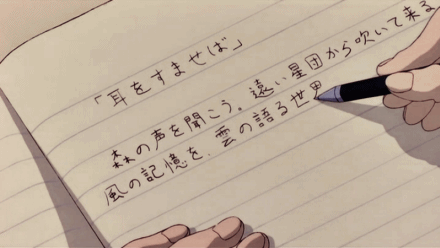
What are "cool kanji party tricks"? This is just a list of things I have noticed that having a solid understanding of kanji will allow you to do. I have been studying Japanese for more than 10 years, and most of these things I just noticed one day in an a-ha moment, and even though someone had told me for years that learning and practicing kanji is important, it took several realizations for me to truly grasp what that meant. I would say that many of these require an intermediate grasp of the language to be able to use consistently, but I think that you can start doing any of these after achieving a basic foundation in the Japanese language.
So when your hand is cramped from writing the same kanji for hours, when on'yomi and kun'yomi have become swear words, and when you lost that one little point on the exam because the kanji you were supposed to use was only off by one stroke from the kanji you actually used... I hope you will remember this post and feel a little bit encouraged.
Find the appropriate kanji to use when typing in the romaji/hiragana on a computer/phone
Since I started my Japanese studies during high school, the formal classes I was taking had me writing out kanji for homework in order to remember it and to be able to pass the quizzes and exams. So I spent many hours writing out kanji only to end up with hand cramps and ugly looking written characters. It took ages and the stream of kanji that I had to learn seemed endless. However, one benefit I quickly saw was that I was able to quickly adapt to typing in Japanese on a computer/phone because I was able to correctly identify the kanji that I had practiced, and knew which one to select when several choices came up.
In Japanese, many words have the same sounds but different kanji and meanings (these are called homophones). So when you type in the hiragana or romaji for a word into the keyboard, it will prompt you with a list of kanji to choose from. Being able to correctly select the right one is something I suddenly realized I could do one day, even if I hadn't used the word often. I knew and could recall a larger number of kanji than I thought, and I could eliminate any incorrect kanji for the word I was trying to use. Having a good solid foundation in kanji characters means that you don't have to go look up every word in the dictionary to check that you have the right kanji, and you also don't have to leave the word in kana because you can't guess the right kanji, but rather you are confident enough to pick the correct kanji for the word on your own. This makes typing more efficient and saves time!
Understand the meaning of a word just by looking at the kanji
When you know a significant amount of kanji and what they mean, sometimes when you encounter new compound words you can guess at what they mean. Or if you are like me and sometimes forget how to read words you are already supposed to know, you can magically relearn them by looking at the kanji and interpreting the meaning. So sometimes when I am reading text in Japanese and I see a compound I don't know, I can interpret the meaning from context and from my understanding of the individual kanji, and continue through the text without stopping to look up the word. This helps you to get the gist of a text without having to look up all the words, and is how you can start reading more advanced books or manga.
Guess at the pronunciation of a word from the kanji
On the flip side of the previous cool party trick is being able to guess how to pronounce a word by knowing the on'yomi and kun'yomi of the kanji, and therefore being able to guess at the pronunciation of a word. Unless the word has 人 or 生 in it. This helps most when reading out loud in class or to another person. It will also help you to feel smug about yourself while reading a book that is of a more advanced level and being able to determine the reading of several compound words in a row.
Understanding a new word using kanji clues
As an extension of the previous cool party tricks, I eventually reached the point where I could hear a word in conversation that I had never heard before, and figure out the meaning using kanji clues.
For example, not all Japanese people know English (shocking, right?), and busting out your phone to look up every single word you don't know can become burdensome in continuing the flow of a conversation. So, if I hear a word that I don't know during a conversation (and the continuation or flow of the conversation hinges on my understanding of the word), I will stop the person and either ask what kanji the word is written with, or if I have a guess I will ask "is this using the kanji for X?" This way I can gain clues to the key word without stopping the flow of conversation too much. (It's also a fun way to show off to Japanese speakers.)
For example, if you hear the word jishin (じしん) in conversation, and you aren't sure which meaning the speaker intended:
自信 self-confidence
自身 one's self
You can ask:
"Did you mean 自信 (jishin) with the "shin" from 信用 (shin'you) or did you mean 自身 (jishin) with the "mi" (another pronunciation of 身) as in one's body?"
Then the person can respond:
"Oh, I mean 身 (mi)! As in, 自分自身 (jibun jishin), or one's self."
Then, you can continue the conversation, having an understanding of what the speaker is saying and not having to take out your phone to translate as often. This also can give the person you are speaking to a better sense of your level and help them to tailor the conversation to you.
[I hope this conveys what I am trying to illustrate ^.^]
TL;DR: Kanji is Fun
Honestly, when kanji clicks and you can read words or understand their meanings, it's like deciphering a secret code, and this is one of the things I find so cool about Japanese, and why I have studied it for so long. So if you are just starting out and are daunted by kanji - don't worry. I am still daunted by kanji, but I also find it a useful tool to improve my knowledge of Japanese and to communicate in a way many people cannot. I hope this information was useful and inspires you to suffer through learn more kanji.
181 notes
·
View notes
Text

It was the first day of my study schedule today and I got everything done.
Basically I did 5 grammar patters, learned 40 vocabs and 14 kanjis.
Hopefully tomorrow I can get it done earlier so I have more time to relax during the night!
#japanese#japanese language#jlpt#jlpt n2#languages#studyblr#studying#japanese books#language learning#study with me#study blog#study motivation#study aesthetic#ray chen#violin#classical music
40 notes
·
View notes
Text
Hey! Haven't posted here in a while lol
I'm finally done with my degree so now I have Japanese as my main and only priority.
I needed to make a full plan for the coming months so I did that and it starts from Tomorrow!
I hope all of you are also doing great in your Japanese studying. Lemme know if y'all are studying for the December JLPT!
I also bought coloring books cause the anxiety gets to me whenever I study lol so turning to art therapy to help myself deal with that.

#japanese#japanese language#jlpt#jlpt n2#languages#studyblr#studying#japanese books#language learning#study with me
4 notes
·
View notes
Text
Hey Everyone!
I hope everyone is doing great.
My studying has been going well. I'm getting more and more consistent these days so I'm really proud of it :3
The syllabus is sooooo much tho which is a bit overwhelming but hopefully it all works out. Also, I really recommend Nihongo no Tabi videos! They explain everything very clearly.
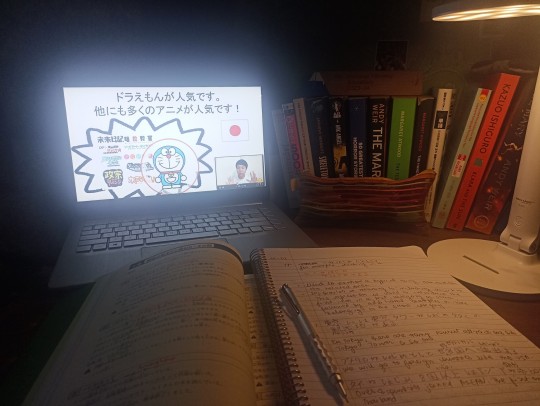
#japanese#japanese language#jlpt#jlpt n2#languages#studyblr#studying#japanese books#language learning#study with me#studyinspo#study aesthetic#study motivation#study blog#japanese learning#japanese grammar#japan
22 notes
·
View notes
Text
My kanji is terrible and I recently learned about the book by Andrew Scott Conning.
The Kanji Learner Course is an amazing book for learning kanji, the best thing about it which made me buy it was the fact that it explains how to remember every single kanji like a teacher.
I have only done till the first 100 kanjis for now but it's definitely a wonderful book!
I highly recommend buying it if you want a comprehensive kanji book.

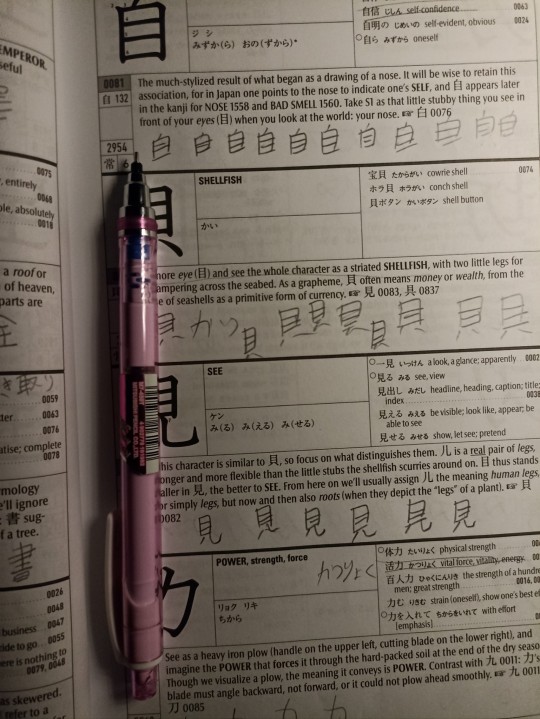
#japanese#japanese language#jlpt#jlpt n2#languages#studyblr#studying#japanese books#language learning#study with me#kanji#japanese kanji#andrewscottconning#kanjicourse
95 notes
·
View notes
Text
Hi!
My progress has been going good and I'm getting better at being consistent. Trying my best to cover as much as I can everyday!


#japanese#japanese language#jlpt#jlpt n2#languages#studyblr#studying#japanese books#language learning#study with me
6 notes
·
View notes